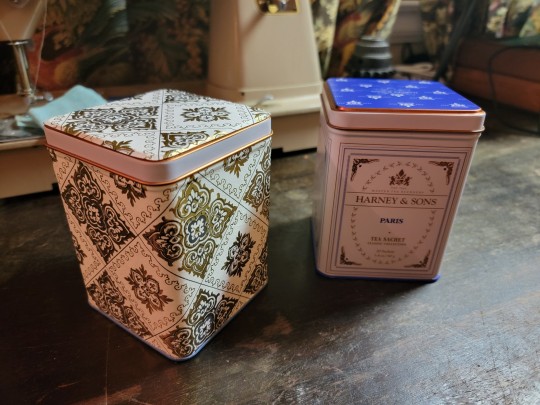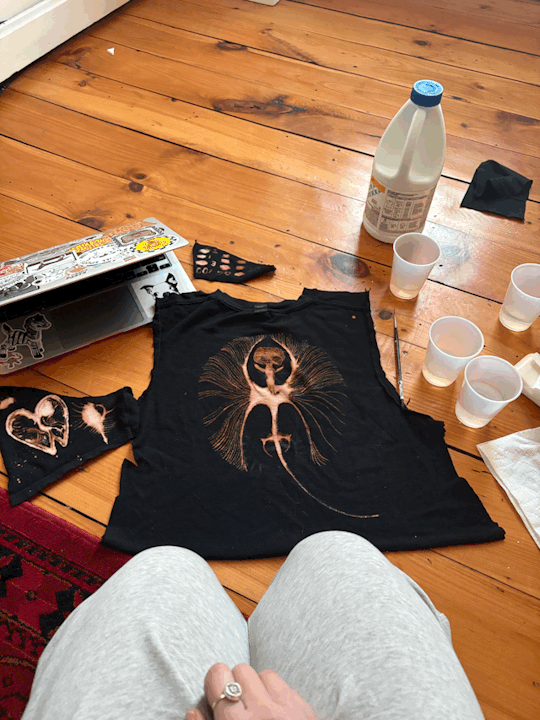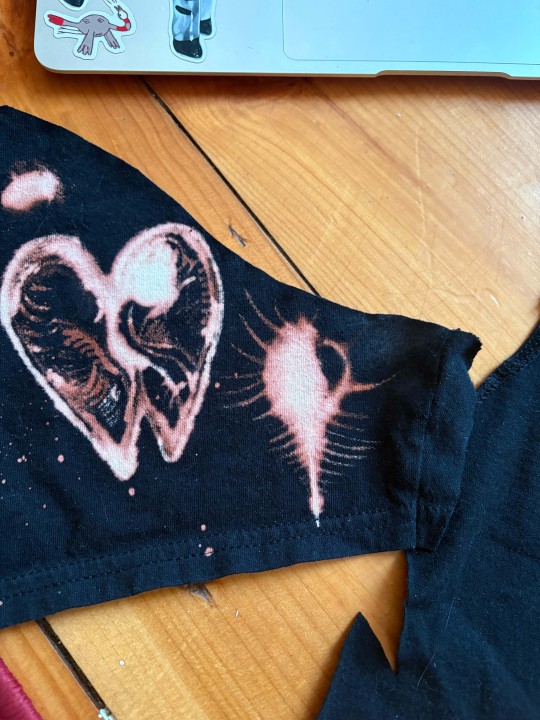#recycle reduce reuse
Explore tagged Tumblr posts
Text

Stitch #1 on the overly long found fabrics quilt top. I wonder how long before I regret my life choices? 😅
4 notes
·
View notes
Text
"The slogan 'refuse, reduce, reuse, repair and recycle' provides us with a hierarchy of strategies for dealing with waste. Refuse means to decide not to engage in the consuming action or task in the first place because it is not necessary. Reduce means to minimize the materials and energy required or the frequency of the consuming action. Reuse means either reuse for the same purpose or put to the next best use. Repair means to use skill and very limited additional resources to restore function. Recycle means to break down into more basic elements or materials before being reprocessed for the same or other uses."
- Permaculture: Principles & Pathways Beyond Sustainability by David Holgren, page 112
#permaculture#refuse reduce reuse repair recycle#waste#environmental#sustainability#environment#waste reduction
2K notes
·
View notes
Text





SINBAD:LEGEND OF THE SEVEN SEAS (2003)
#sinbad#sinbad legend of the seven seas#moviegifs#fyeahmovies#filmgifs#dailyflicks#tuserdana#filmedit#animationedit#animationsource#animationdaily#sinbad legend of the seven seas 2003#sinbadedit#animationsdaily#reuse reduce recycle#uploading my old gifs hmm i think i had this in 720😔#💗#gif
8K notes
·
View notes
Text
It’s an open secret in fashion. Unsold inventory goes to the incinerator; excess handbags are slashed so they can’t be resold; perfectly usable products are sent to the landfill to avoid discounts and flash sales. The European Union wants to put an end to these unsustainable practices. On Monday, [December 4, 2023], it banned the destruction of unsold textiles and footwear.
“It is time to end the model of ‘take, make, dispose’ that is so harmful to our planet, our health and our economy,” MEP Alessandra Moretti said in a statement. “Banning the destruction of unsold textiles and footwear will contribute to a shift in the way fast fashion manufacturers produce their goods.”
This comes as part of a broader push to tighten sustainable fashion legislation, with new policies around ecodesign, greenwashing and textile waste phasing in over the next few years. The ban on destroying unsold goods will be among the longer lead times: large businesses have two years to comply, and SMEs have been granted up to six years. It’s not yet clear on whether the ban applies to companies headquartered in the EU, or any that operate there, as well as how this ban might impact regions outside of Europe.
For many, this is a welcome decision that indirectly tackles the controversial topics of overproduction and degrowth. Policymakers may not be directly telling brands to produce less, or placing limits on how many units they can make each year, but they are penalising those overproducing, which is a step in the right direction, says Eco-Age sustainability consultant Philippa Grogan. “This has been a dirty secret of the fashion industry for so long. The ban won’t end overproduction on its own, but hopefully it will compel brands to be better organised, more responsible and less greedy.”
Clarifications to come
There are some kinks to iron out, says Scott Lipinski, CEO of Fashion Council Germany and the European Fashion Alliance (EFA). The EFA is calling on the EU to clarify what it means by both “unsold goods” and “destruction”. Unsold goods, to the EFA, mean they are fit for consumption or sale (excluding counterfeits, samples or prototypes)...
The question of what happens to these unsold goods if they are not destroyed is yet to be answered. “Will they be shipped around the world? Will they be reused as deadstock or shredded and downcycled? Will outlet stores have an abundance of stock to sell?” asks Grogan.
Large companies will also have to disclose how many unsold consumer products they discard each year and why, a rule the EU is hoping will curb overproduction and destruction...
Could this shift supply chains?
For Dio Kurazawa, founder of sustainable fashion consultancy The Bear Scouts, this is an opportunity for brands to increase supply chain agility and wean themselves off the wholesale model so many rely on. “This is the time to get behind innovations like pre-order and on-demand manufacturing,” he says. “It’s a chance for brands to play with AI to understand the future of forecasting. Technology can help brands be more intentional with what they make, so they have less unsold goods in the first place.”
Grogan is equally optimistic about what this could mean for sustainable fashion in general. “It’s great to see that this is more ambitious than the EU’s original proposal and that it specifically calls out textiles. It demonstrates a willingness from policymakers to create a more robust system,” she says. “Banning the destruction of unsold goods might make brands rethink their production models and possibly better forecast their collections.”
One of the outstanding questions is over enforcement. Time and again, brands have used the lack of supply chain transparency in fashion as an excuse for bad behaviour. Part of the challenge with the EU’s new ban will be proving that brands are destroying unsold goods, not to mention how they’re doing it and to what extent, says Kurazawa. “Someone obviously knows what is happening and where, but will the EU?”"
-via British Vogue, December 7, 2023
#fashion#slow fashion#style#european union#eu#eu news#eu politics#sustainability#upcycle#reuse#reduce reuse recycle#ecofriendly#fashion brands#fashion trends#waste#sustainable fashion#sustainable living#eco friendly#good news#hope
10K notes
·
View notes
Text

839 notes
·
View notes
Text
true love is sacrificing your birthday cake being chocolate for your partners health and then immediately making him drink the most disgusting concoction of soup and licorice water for a gaming video
#I made a post with this exact format before but it was funny so#reduce reuse recycle#dan and phil#dan and phil games#amazingphil#daniel howell#dan howell#phil lester#danisnotonfire#phan
3K notes
·
View notes
Text

back here again
#charles art#the partys over and hes still here!!!! < @ myself#the pitt#jack abbot#dr robby#rabbot#robbot#abbot x robby#robby x abbot#dr abbot#art#the pitt art#the pitt fanart#michael robinavitch#dr jack abbot#robby robinavitch#charles did this#this has the same base sketch as another drawing i made if you somehow notice shhhh shhhhhhhhh#reduce reuse recycle and all that
289 notes
·
View notes
Text
Patchwork makeup bags





Made patchwork makeup bags out of secondhand and recycled materials to ask my BFFs to be my bridesmaids using this tutorial
#diy#upcycle#upcycled#upcycling#crafts#handmade#ecofriendly#reduce reuse recycle#quilts#quilting#quiltblr#quilt#quilters of tumblr#patchwork#sewing#makeup#makeup bag#wastelesscrafts#wasteless crafts#zero waste#zerowaste#cozytumblr#cozycore#cozy aesthetic#cozy vibes#cozy#secondhand#thrifting#thrifstorefinds#secondhand crafts
642 notes
·
View notes
Text

Ive been really enjoying making patches out of scrap fabric recently
#bin creates#diy#punk#alternative#patch#patches#reduce reuse recycle#solarpunk#lgbt#lgbtq#queer#aromantic#28 days later#diy patches#diy or die
296 notes
·
View notes
Text

This year, I’m trying to not buy new fabric and to use the fabrics and scraps I already have. Here is a quilted vest I made using some coton scraps.
The vest pattern is the Gabriela from FibreMood.
I cut 3 1/2’’ squares for the quilt!
369 notes
·
View notes
Text
We have this old purple fleece or felt (I have no clue what this thing is made of but I guarantee every middle class household in the 90s had one) blanket that we inherited from my mother in law when we moved into her house. It had some holes but it was still mostly together and it held no sentimental value so it was perfect for me to practice on.
I started doing a weaving type mend with some yarn I had laying around. This green yarn (Lion brand homespun) came in a lot I bought and the previous owner had cut it into short lengths (like 36”) for a project but had never finished. So it really wasn’t good for crochet but it was perfect to use for weaving.

I started with the green and then I was liking the earthy feel with the purple background so I just kept going with some crazy Pom Pom yarn I had a tiny bit of.
And that was looking like moss or fungi so I threw in some yellow.

Then threw in some brown to bring back the earthy feel.
I just kept going in different directions with different yarns until I had filled the hole. And I am so pleased with the result.

I adore the texture this Pom Pom yarn made. Sadly I don’t have any more and I can’t find it online to save my life.

On to another hole. Went for brown base threads (warp threads???) instead of the string I had been using. I have to get more pictures of how this one is turning out because I’m almost positive I’ve finished this hole but I put the blanket away for some reason.


These are some pictures of moss? lichen?? On a tree for inspo because this is what the weaving reminded me of.


#mending#visible mending#weaving#fiber crafts#fiber art#yarn#crafting#slow living#blanket repair#repair#reduce reuse recycle#moss#lichen#mosscore#earthy
362 notes
·
View notes
Text
We ask your questions so you don’t have to! Submit your questions to have them posted anonymously as polls.
#polls#incognito polls#anonymous#tumblr polls#tumblr users#questions#polls about ethics#submitted june 7#recycling#reduce reuse recycle
737 notes
·
View notes
Text

Getting a head start on my Depression crafting era by decoupaging (with mod podge) over some old tea tins and using them for storage.
(Yeah, I should have centered that, huh, but I learned the hard way my paper cutter is no longer sharp.)
149 notes
·
View notes
Text
"Kristina Smithe was running the California International Marathon in 2019, grabbing cups of water to stay hydrated, when she started to think about how much waste such events produce. On the flight home, she did the math: 9,000 runners, 17 aid stations and something like 150,000 cups used once and thrown away.
“I was just shocked that, even in California, it’s not sustainable,” Smithe said.
That sparked her idea for something more durable — a lightweight, pliable silicone cup that could be used again and again. After working out a design, Smithe ordered her first shipment and tested them at a race in 2021.
Now her business, Hiccup Earth, has 70,000 cups that Smithe rents out to interested races to replace the typical white paper cups that can pile up like snowdrifts at busy water stops.
Billions of disposable cups are used around the world each year. These cups are often made of plastic, but even if they are made of paper, they typically have a plastic lining that makes it difficult for them to biodegrade. And making these cups, and disposing or burning them, generates planet-warming greenhouse gas emissions.
“That’s just a small subset of the amount of plastic waste that we produce, but it’s a pretty visible one,” said Sarah Gleeson, solutions research manager and plastics waste expert at climate nonprofit Project Drawdown. “It’s something that generates a lot of waste, and waste — depending on what exactly it’s made of — can really last in landfills for hundreds of years.”
As she was getting her business off the ground, Smithe emailed race directors to ask if their event used disposable cups.
“The answer was always yes,” she said. Her response: “If you’re looking for a sustainable solution, I have one.”
Now, she rents out the cups by the thousand, driving them to events in massive totes and leaving bins with the company logo for collection after use. Smithe picks up the used cups and washes them in a proprietary dishwasher.
At the PNC Women Run the Cities race in Minneapolis and St. Paul, Minnesota, in early May, Smithe helped quench the thirst of thousands of runners, dropping off 17-gallon tote bags full of her flexible blue cups.
After that race, Smithe, 35, estimated she’s taken her cups to 137 races and spared 902,000 disposable ones from the landfill. She also says her washing process needs only 30 gallons (114 liters) of water per 1,500 cups. An average efficient household dishwasher uses 3 to 5 gallons (11 to 19 liters) for far fewer dishes.
“It’s just a solution to a problem that’s long overdue,” Smithe said.
One trade-off is that the cup rentals cost race directors more than other options. Disposable cups might run just a few cents each, while 10,000 Hiccup cups would rent for about 15 cents each. That price drops if more cups are needed.
Gleeson, of Project Drawdown, sees the reusable cups as just one of many ways that innovators are looking to cut down on waste. Such solutions often have to be rooted in convenience and grounded in local or small applications to get more people to adopt them. Some cities, for instance, are experimenting with reusable food takeout containers that customers return to nearby drop-off spots later on.
While no one solution can fully tackle the problem, “The scalability is there,” Gleeson said. “I think in general, high adoption of these kinds of solutions is what is able to bring costs down and really maximize environmental benefits that you could get.”"
-via AP News, May 27, 2025
#plastic#plastic waste#running#marathon#united states#california#minnesota#north america#reuse#reduce reuse recycle#reduce#reusable#plastic pollution#waste#waste management#good news#hope
853 notes
·
View notes
Text


did some tests today with bleach and fabric :-) I had sea creatures on the brain today, if you can't tell
#bleach painting#diy projects#diy punk#upcycling#reduce reuse recycle#creative reuse#art#illustration#artists on tumblr#traditional art#doodle#artwork#marine life#marine biology#stingray#sea shells#ocean#sea creatures#ethereal
261 notes
·
View notes
Text

#sustainable living#sustainable home#sustainablefashion#sustainableliving#sustainability#ecofriendly#eco friendly#eco friendly living#sustainable lifestyle#sustainable habits#environmental impact#environmentallyfriendly#environmentalism#low waste#zero waste#reduce reuse recycle#crunchy mom#homemaking#hippie mom#dark cottagecore#cottagecore#cottage aesthetic#cozy cottage#solarpunk#cozy aesthetic#hippie aesthetic#eco lifestyle#eco living#low impact#health is wealth
189 notes
·
View notes